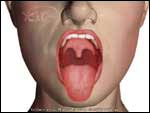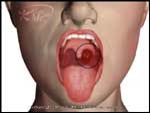|
|
 |
Oral cancers
|
 |

Normal |

Abnormal |
| |
- Oral Cancers affect various parts of the oral cavity, including the mouth (floor, roof, tongue, gums, and cheeks) lips, tonsils and the upper part of the throat. The cancer cells invade and destroy the local structures, using blood and lymphatic channels that spread to and destroy other parts of the body.
- There are many forms of Oral Cancers, but the most common are cancers of the lining of the oral cavity called squamous cell carcinoma.
- The sides of the tongue (closest to
the back of the throat), is the most common site, followed
by the area under the tongue, and finally, the cheeks.
- Adenocarcinomas are rare cancers of small salivary glands (glands that produce saliva). Other rare forms include Lymphoma, Leukemia, and melanomas.
|
 |
- A person may notice a white patchy area or a velvety red patch with white spots on the roof of the mouth (palate).
- In case of adenocarcinoma, there may be an enlargement of the salivary glands (soft lumps felt on the roof or floor of the mouth).
- Ulcers or erosions that do not heal within a couple of weeks.
- Usually, a painless wart or crater develops
- Painful or enlarged mass
- Melanomas can be present as a brown or dark color mole on the roof of the mouth or over the gums (gingiva).
- Lymph nodes in the neck may be enlarged and feel like a soft rubbery kidney bean
- Difficulty with speaking or tongue movements
- Change in the taste of the mouth
- Numbness around the lesion
- Teeth may be loose or fall out
- Persistent Bad Breath or Halitosis
|
 |
- Smoking or chewing tobacco
- Alcohol abuse
- Sun exposure causes damage to the skin of the lips
- Gum or dental diseases may play a role
- Constant mouth irritation and injury
- High alcohol content mouth washes and infections with Herpes Simplex and Papilloma viruses may be a cause.
|
 |
- In the late stages, lesions often found by a patient or a dentist.
- The most effective test is a direct biopsy under local anesthesia where the physician (often an Oral surgeon or a head and neck specialist) numbs the area of the cancer, takes a small piece of it, and sends it to a pathologist, who identifies the cancer by examining it under a microscope.
- X-Rays of the jawbone are usually done
- An MRI or CAT scan of the head and neck provide detailed pictures of the surrounding area, and telling us if the cancer has spread.
|
 |
- Cigarettes
- Cigars
- Pipes -- the lips are often involved
- Chewing tobacco -- in Sri Lanka and India, they chew tobacco with the betel nut, and have a very high rate of Oral Cancer.
- Lichen Planus, a whitish area can occur any where in the mouth.
- Alcohol
- Males over 40 who smoke or drink.
- Sun exposure -- for lip cancer only.
- Reverse smoking (the lit side of the cigarette in the mouth).
- Patients with kidney transplants have slight increased risk of lip cancer.
|
 |
- Treatment is done by the surgical removal of the lesion.
- Surgery is done in the hospital by a head and neck specialist, or by an Oral surgeon
- The surgeon removes the cancer and some of the tissues that surround it
- The lymph nodes (soft bean like lumps) in the neck may be removed and examined for the possible spread of the cancer to these nodes.
- If the cancer has spread to jaw
bones, the surgeon may need to remove the affected bones.
- Surgery may be followed with a course of chemotherapy (cancer killing medications) that may last for weeks to months
- Chemotherapy can be given before or after surgery to reduce the risk of cancer returning.
- Chemotherapy has side effects such as nausea, hair loss, infections, or damage to the kidneys, blood cells, and liver.
- Medications can help with some of the side effects
- Frequent monitoring of the blood
- Radiation therapy (radioactive rays or material) is used to stop the diseases from advancing or to alleviate pain
- The radiation is either given via a machine that sends radioactive rays from outside to the cancer, or by radioactive chemicals that are placed in or around the cancer.
- Painkillers such as Codeine or morphine are used for severe pain
- Heat therapy (hyperthermia) and other cancer killing methods are still in the testing phase.
- Only 30-40% of patients are alive after 5 years despite therapy primarily due to late diagnoses, so if you smoke or drink, it's time to quit! Get frequent (every six month) dental or mouth check ups.
- Remind your regular doctor to look into your mouth when you are getting your annual check ups
- Vegetables and fruits may have a protective effect against some cancers
|
 |
-
Do not panic. Call your dentist or physician and schedule a visit. The national cancer institute at 1-800-4 CANCER may be of some help.
|
 |
- Candida (a fungus) -- an infection of the mouth
- Herpes infection of the mouth and lips
- Non-cancerous lumps, bony growths, or white patches
|
| | |
If you want your friend to read or know about this article, Click here
 |
|
|

